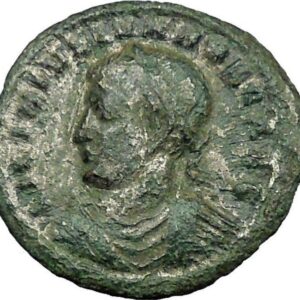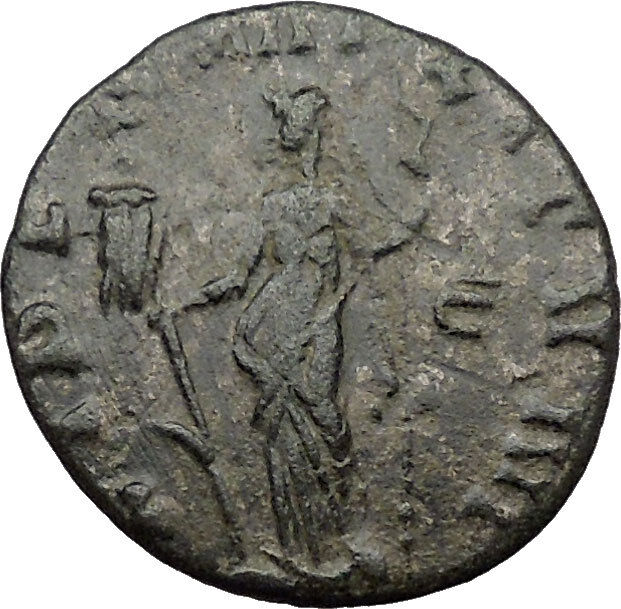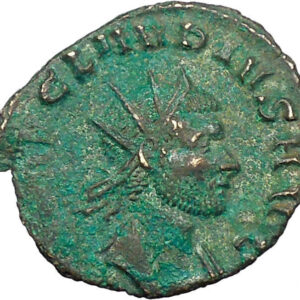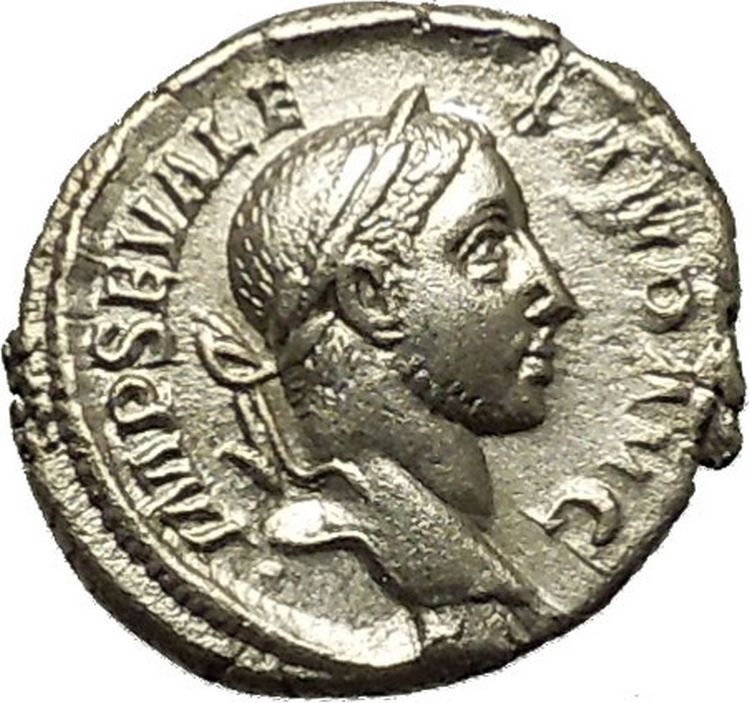|
Antoninus Pius – Roman Emperor: 138-161 A.D.
Silver Denarius 16mm (2.97 grams) Rome mint, struck 159-160 A.D.
Reference: RIC III 299; RSC 374; BMC 972; Sear 4081
ANTONINVS AVG PIVS P P TR P XXIII, laureate head to right.
FELICITATI AVG COS IIII, Felicitas-Providentia standing to left holding globe and cornucopia.
8o
You are bidding on the exact item pictured, provided with a Certificate of Authenticity and Lifetime Guarantee of Authenticity.
In ancient Roman culture, felicitas (from the Latin adjective felix, “fruitful, blessed, happy, lucky”) is a condition of divinely inspired productivity, blessedness, or happiness. Felicitas could encompass both a woman’s fertility, and a general’s luck or good fortune. The divine personification of Felicitas was cultivated as a goddess. Although felicitas may be translated as “good luck,” and the goddess Felicitas shares some characteristics and attributes with Fortuna, the two were distinguished in Roman religion. Fortuna was unpredictable and her effects could be negative, as the existence of an altar to Mala Fortuna (“Bad Luck”) acknowledges. Felicitas, however, always had a positive significance. She appears with several epithets that focus on aspects of her divine power.
Felicitas had a temple in Rome as early as the mid-2nd century BC, and during the Republican era was honored at two official festivals of Roman state religion, on July 1 in conjunction with Juno and October 9 as Fausta Felicitas. Felicitas continued to play an important role in Imperial cult, and was frequently portrayed on coins as a symbol of the wealth and prosperity of the Roman Empire. Her primary attributes are the caduceus and cornucopia. The English word “felicity” derives from felicitas.
As virtue or quality
In its religious sense, felix means “blessed, under the protection or favour of the gods; happy.” That which is felix has achieved the pax divom, a state of harmony or peace with the divine world. The word derives from Indo-European *dhe(i)l, meaning “happy, fruitful, productive, full of nourishment.” Related Latin words include femina, “woman” (a person who provides nourishment or suckles); felo, “to suckle” in regard to an infant; filius, “son” (a person suckled); and probably fello, fellare, “to perform fellatio”, with an originally non-sexual meaning of “to suck”. The continued magical association of sexual potency, increase, and general good fortune in productivity is indicated by the inscription Hic habitat Felicitas (“Felicitas dwells here”) on an apotropaic relief of a phallus at a bakery in Pompeii.
In archaic Roman culture, felicitas was a quality expressing the close bonds between religion and agriculture. Felicitas was at issue when the suovetaurilia sacrifice conducted by Cato the Elder as censor in 184 BC was challenged as having been unproductive, perhaps for vitium, ritual error. In the following three years Rome had been plagued by a number of ill omens and prodigies (prodigia), such as severe storms, pestilence, and “showers of blood,” which had required a series of expiations (supplicationes). The speech Cato gave to justify himself is known as the Oratio de lustri sui felicitate, “Speech on the Felicitas of his Lustrum”, and survives only as a possible quotation by a later source. Cato says that a lustrum should be found to have produced felicitas “if the crops had filled up the storehouses, if the vintage had been abundant, if the olive oil had flowed deliberately from the groves”, regardless of whatever else might have occurred. The efficacy of a ritual might be thus expressed as its felicitas.
The ability to promote felicitas became proof of one’s excellence and divine favor. Felicitas was simultaneously a divine gift, a quality that resided within an individual, and a contagious capacity for generating productive conditions outside oneself: it was a form of “charismatic authority”. Cicero lists felicitas as one of the four virtues of the exemplary general, along with knowledge of military science (scientia rei militaris), virtus (both “valor” and “virtue”), and auctoritas, “authority.” Virtus was a regular complement to felicitas, which was not thought to attach to those who were unworthy. Cicero attributed felicitas particularly to Pompeius Magnus (“Pompey the Great”), and distinguished this felicitas even from the divine good luck enjoyed by successful generals such as Fabius Maximus, Marcellus, Scipio the Younger and Marius.
The sayings (sententiae) of Publilius Syrus are often attached to divine qualities, including Felicitas: “The people’s Felicitas is powerful when she is merciful” (potens misericors publica est Felicitas).
Epithets
Epithets of Felicitas include:
- Augusta, the goddess in her association with the emperor and Imperial cult.
- Fausta (“Favored, Fortunate”), a state divinity cultivated on October 9 in conjunction with Venus Victrix and the Genius Populi Romani (“Genius” of the Roman People, also known as the Genius Publicus).
- Publica, the “public” Felicitas; that is, the aspect of the divine force that was concerned with the res publica or commonwealth, or with the Roman People (Populus Romanus).
- Temporum, the Felicitas “of the times”, a title which emphasize the felicitas being experienced in current circumstances.
 Antoninus Pius – 138-161 A.D. Antoninus Pius – 138-161 A.D.
Caesar: 138 A.D. (under Hadrian)
Augustus: 138-161 A.D.
| Adopted son and successor of Hadrian | Husband of Faustina Senior | Father of Faustina Junior and Galerius Antoninus | Grandfather of Commodus, Annius Verus, Lucilla and Aurelius Antoninus | Adoptive father of Marcus Aurelius and Lucius Verus |
Titus Aurelius Fulvus Boionius Arrius Antoninus (19 September 86 – 7 March 161), generally known in English as Antoninus Pius was Roman emperor from 138 to 161. He was the fourth of the Five Good Emperors and a member of the Aurelii. He did not possess the sobriquet “Pius” until after his accession to the throne. Almost certainly, he earned the name “Pius” because he compelled the Senate to deify his adoptive father Hadrian; the Historia Augusta, however, suggests that he may have earned the name by saving senators sentenced to death by Hadrian in his later years.
He was the son and only child of Titus Aurelius Fulvus, consul in 89 whose family came from Nemausus (modern Nîmes) and was born near Lanuvium and his mother was Arria Fadilla. Antoninus’ father and paternal grandfather died when he was young and he was raised by Gnaeus Arrius Antoninus, his maternal grandfather, a man of integrity and culture and a friend of Pliny the Younger. His mother married to Publius Julius Lupus (a man of consular rank), Suffect Consul in 98, and bore him a daughter called Julia Fadilla.
As a private citizen between 110 and 115, he married Annia Galeria Faustina the Elder. They had a very happy marriage. She was the daughter of consul Marcus Annius Verus and Rupilia Faustina (a half-sister to Roman Empress Vibia Sabina). Faustina was a beautiful woman, renowned for her wisdom. She spent her whole life caring for the poor and assisting the most disadvantaged Romans.
Having filled with more than usual success the offices of quaestor and praetor, he obtained the consulship in 120; he was next appointed by the Emperor Hadrian as one of the four proconsuls to administer Italia, then greatly increased his reputation by his conduct as proconsul of Asia. He acquired much favor with the Emperor Hadrian, who adopted him as his son and successor on 25 February, 138, after the death of his first adopted son Lucius Aelius, on the condition that Antoninus would in turn adopt Marcus Annius Verus, the son of his wife’s brother, and Lucius, son of Aelius Verus, who afterwards became the emperors Marcus Aurelius and Lucius Verus (colleague of Marcus Aurelius).
Emperor
On his accession, Antoninus’ name became “Imperator Caesar Titus Aelius Hadrianus Antoninus Augustus Pontifex Maximus”. One of his first acts as Emperor was to persuade the Senate to grant divine honours to Hadrian, which they had at first refused; his efforts to persuade the Senate to grant these honours is the most likely reason given for his title of Pius (dutiful in affection; compare pietas). Two other reasons for this title are that he would support his aged father-in-law with his hand at Senate meetings, and that he had saved those men that Hadrian, during his period of ill-health, had condemned to death. He built temples, theaters, and mausoleums, promoted the arts and sciences, and bestowed honours and financial rewards upon the teachers of rhetoric and philosophy.
In marked contrast to his predecessors Trajan and Hadrian, Antoninus was not a military man. One modern scholar has written “It is almost certain not only that at no time in his life did he ever see, let alone command, a Roman army, but that, throughout the twenty-three years of his reign, he never went within five hundred miles of a legion”. His reign was the most peaceful in the entire history of the Principate; while there were several military disturbances throughout the Empire in his time, in Mauretania, Iudaea, and amongst the Brigantes in Britannia, none of them are considered serious. The unrest in Britannia is believed to have led to the construction of the Antonine Wall from the Firth of Forth to the Firth of Clyde, although it was soon abandoned. He was virtually unique among emperors in that he dealt with these crises without leaving Italy once during his reign, but instead dealt with provincial matters of war and peace through their governors or through imperial letters to the cities such as Ephesus (of which some were publicly displayed). This style of government was highly praised by his contemporaries and by later generations.
Of the public transactions of this period we have scant information, but, to judge by what we possess, those twenty-two years were not remarkably eventful in comparison to those before and after his; the surviving evidence is not complete enough to determine whether we should interpret, with older scholars, that he wisely curtailed the activities of the Roman Empire to a careful minimum, or perhaps that he was uninterested in events away from Rome and Italy and his inaction contributed to the pressing troubles that faced not only Marcus Aurelius but also the emperors of the third century. German historian Ernst Kornemann has had it in his Römische Geschichte [2 vols., ed. by H. Bengtson, Stuttgart 1954] that the reign of Antoninus comprised “a succession of grossly wasted opportunities,” given the upheavals that were to come. There is more to this argument, given that the Parthians in the East were themselves soon to make no small amount of mischief after Antoninus’ passing. Kornemann’s brief is that Antoninus might have waged preventive wars to head off these outsiders.
Scholars place Antoninus Pius as the leading candidate for fulfilling the role as a friend of Rabbi Judah the Prince. According to the Talmud (Avodah Zarah 10a-b), Rabbi Judah was very wealthy and greatly revered in Rome. He had a close friendship with “Antoninus”, possibly Antoninus Pius, who would consult Rabbi Judah on various worldly and spiritual matters.
After the longest reign since Augustus (surpassing Tiberius by a couple of months), Antoninus died of fever at Lorium in Etruria, about twelve miles (19 km) from Rome, on 7 March 161, giving the keynote to his life in the last word that he uttered when the tribune of the night-watch came to ask the password-“aequanimitas” (equanimity). His body was placed in Hadrian’s mausoleum, a column was dedicated to him on the Campus Martius, and the temple he had built in the Forum in 141 to his deified wife Faustina was rededicated to the deified Faustina and the deified Antoninus.
Historiography
The only account of his life handed down to us is that of the Augustan History, an unreliable and mostly fabricated work. Antoninus is unique among Roman emperors in that he has no other biographies. Historians have therefore turned to public records for what details we know.
In later scholarship
Antoninus in many ways was the ideal of the landed gentleman praised not only by ancient Romans, but also by later scholars of classical history, such as Edward Gibbon or the author of the article on Antoninus Pius in the ninth edition of the Encyclopedia Britannicaca:
A few months afterwards, on Hadrian’s death, he was enthusiastically welcomed to the throne by the Roman people, who, for once, were not disappointed in their anticipation of a happy reign. For Antoninus came to his new office with simple tastes, kindly disposition, extensive experience, a well-trained intelligence and the sincerest desire for the welfare of his subjects. Instead of plundering to support his prodigality, he emptied his private treasury to assist distressed provinces and cities, and everywhere exercised rigid economy (hence the nickname κυμινοπριστης “cummin-splitter”). Instead of exaggerating into treason whatever was susceptible of unfavorable interpretation, he spurned the very conspiracies that were formed against him into opportunities for demonstrating his clemency. Instead of stirring up persecution against the Christians, he extended to them the strong hand of his protection throughout the empire. Rather than give occasion to that oppression which he regarded as inseparable from an emperor’s progress through his dominions, he was content to spend all the years of his reign in Rome, or its neighborhood.
|




 Antoninus Pius – 138-161 A.D.
Antoninus Pius – 138-161 A.D.




